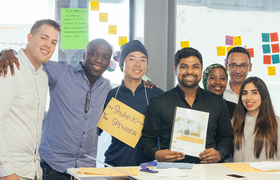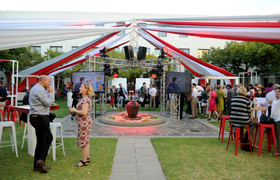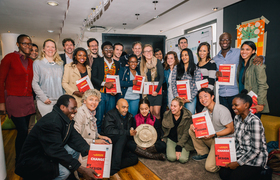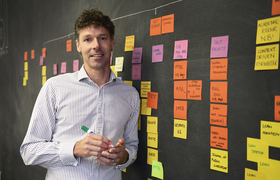UCT’s d-school unlocks creativity to drive innovation
05 December 2017 | Story Jess Oosthuizen.
The Hasso Plattner Institute of Design Thinking (d-school) at UCT is one of only three in the world. Richard Perez, the founding director of the UCT d-school, was the guest speaker at the most recent Café Scientifique. He described how the d-school aims to equip multidisciplinary research teams at UCT with essential design thinking skills for developing innovative solutions to tackle real-world problems.
“Volatile, uncertain, complex and ambiguous are the new normal,” says Perez.
So, supporting innovation in professional and academic environments requires a workforce that can respond and adapt to challenges as they arise. Design thinking involves developing a particular mindset to tackle problems and develop solutions within a changing environment.
“Finding sustainable solutions is about letting go of having the answer and dealing with the uncertainty,” says Perez. “We teach our students to be more comfortable with being creative, explorative and to step into uncertainty”.
Origins of design thinking
The d-school’s approach is centred on the principals of design thinking: a creative, human-centred approach to problem-solving that has its roots in industrial design.
The theory behind the d-school’s design thinking approach emerged from Stanford University’s product design major in the early 2000s. Academics at Stanford began to explore the thinking processes that lead to a good design outcome. Instead of focusing on the aesthetic appeal of good design, they began to investigate the approach that designers followed to conceptualising good design.
This new school of thought prompted the German businessman, Hasso Plattner, to start a school that was centred on the principles of design thinking. The first school opened in Stanford in the USA in 2005 and a second school followed in 2008 in Potsdam, Germany.
Plattner had wanted to open up a d-school at UCT ever since his daughter studied here; the UCT d-school opened doors in 2016 and is the first of its kind in Africa.
Holding the problem space
“You can’t go into solution mode until you’ve held the problem space” says Perez. “It’s about holding the problem space for as long as you can.” Einstein reportedly said that if he only had one hour to solve a problem, he would spend 55 minutes defining the problem and the remaining five minutes solving it. This approach is echoed in the principles of design thinking.
Perez refers to the importance of taking an abductive approach, which involves relying on incomplete observations to develop a solution to a particular problem. Part of this process involves becoming familiar with failure.
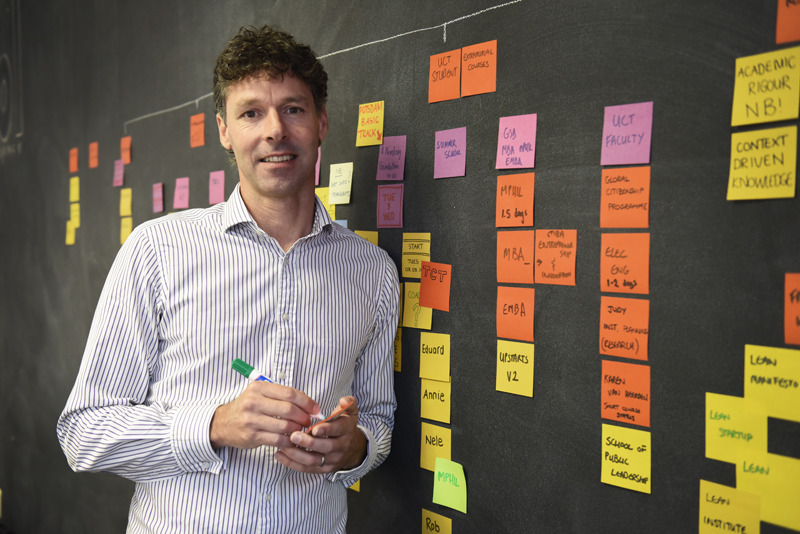
“You’ll probably fail the first time, but over time the solution emerges,” says Perez.
The UCT d-school aims to empower students and staff to feel confident to embrace failure. One of the school’s founding principles is to recognise that failure is instrumental to the learning process.
“Embracing failure is crucial to being able to unlock our creativity,” says Perez. “It’s about making space for and allowing failure to enable people to become more creative.”
Those familiar with the Lean Startup methodology will know that design teams have a particular idea at the outset and work on refining it until it is perfect. By comparison, design thinking involves starting the process without having any idea of what your solution will look like.
Design thinking ecosystem
In conceptual terms, the design thinking space – or ecosystem, as Perez describes it – is made up of three key elements: diversity, a process to follow and the space to do it in.
“The innovation sits within the diversity,” says Perez.
Team work is at the heart of d-school activities, and the focus is on working with interdisciplinary teams to achieve results by drawing on each individual’s different perspective and expertise.
“Design thinking offers a paradigm shift in the way problems can be approached. It dismantles competition by fostering collaboration,” says Professor Ulrich Weinberg, director of the d-school in Potsdam.
“Real human needs should inform the initial search for solutions to a particular problem.”
Perez does not divulge what process is followed in detail, but it’s clear that design thinking occupies both a mental and a physical space. Most importantly, it retains a human-centred approach throughout.
Real human needs should inform the initial search for solutions to a particular problem. One way to identify human needs is to understand issues from the perspective of the people affected, in the context in which they experience them. Identifying solutions to optimise patient care within a hospital environment, for example, could start with observing a patient lying in a hospital bed to understand their experience. Perez reports that this very exercise led a project team to recognise that a large chunk of the patient experience involves looking at the ceiling. The design-thinking process also equips teams with the ability to take a variety of constraints – such as access to technology – into account and suspend these while they work together to identify the best-fit solution.
“It’s about being agile and iterative,” says Perez.
Flexibility is key in both mental and physical terms. The d-school is located in an open-plan space that allows project teams to rethink how they occupy the space they’re working in.
“As the project evolves, the space evolves,” he says.
The UCT d-school itself is also evolving. It is still in its infancy and Perez does not know how Plattner will measure its return on investment.
“Part of the challenge is to use design thinking to solve this and to let the solution emerge,” he says.
Interested UCT postgraduates in any discipline can sign up for a foundation programme taking place in the first semester of 2018.
Read more about the d-school foundation programme…
 This work is licensed under a Creative Commons Attribution-NoDerivatives 4.0 International License.
This work is licensed under a Creative Commons Attribution-NoDerivatives 4.0 International License.
Please view the republishing articles page for more information.







